Key takeaways:
- Soundchecks are vital for building performers’ confidence and fostering a collaborative atmosphere among artists, engineers, and the audience.
- Effective preparation includes a pre-soundcheck meeting, a detailed checklist, and being flexible to adapt to unexpected challenges.
- Essential equipment such as microphones, in-ear monitors, and mixing consoles is crucial for achieving clarity in sound and enhancing performers’ confidence.
- Key steps for conducting a soundcheck involve systematic testing of each sound element, using reference tracks for clarity, and maintaining open communication with performers.
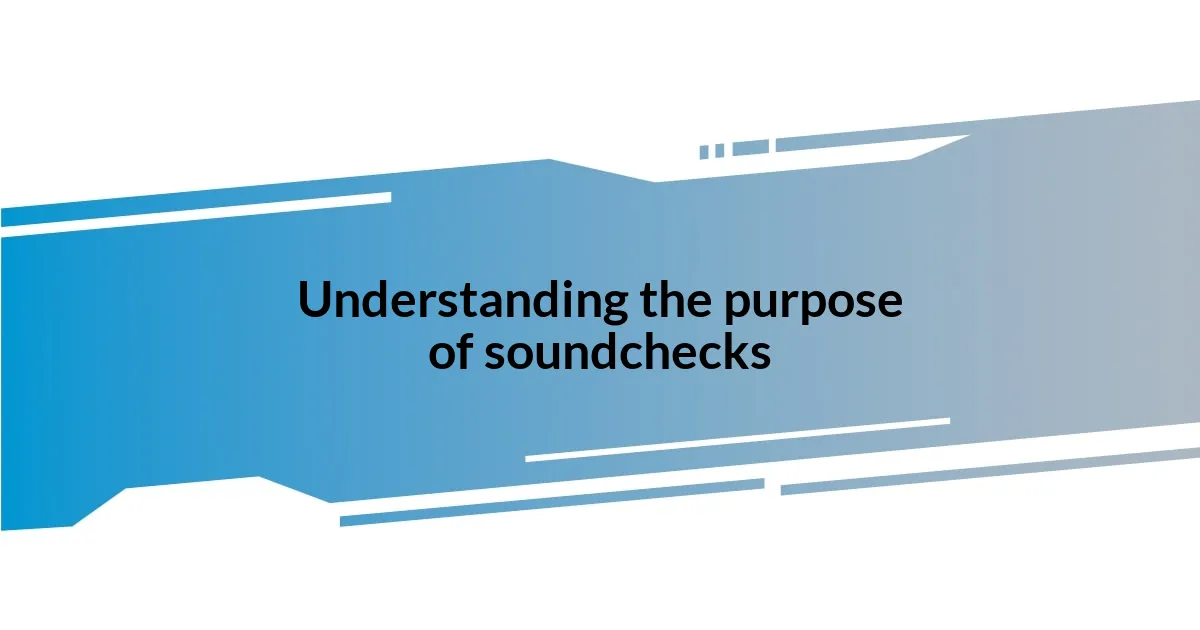
Understanding the purpose of soundchecks
Soundchecks are an essential part of any live performance, serving multiple purposes that often go overlooked. From my experience, it’s not just about adjusting levels; it’s about creating an atmosphere where artists feel comfortable. Have you ever noticed how a quick soundcheck can transform anxiety into confidence? It’s a beautiful thing to witness.
In my early days as a sound engineer, I remember a moment when a band was nervous about their performance. During soundcheck, I encouraged them to experiment with their sound, which allowed them to find their groove. Watching their faces light up as they hit the right notes was incredibly rewarding. This isn’t just about technical adjustments; it’s about giving the performers the freedom to express themselves.
Ultimately, soundchecks are an opportunity for everyone involved—performers, engineers, and even the audience—to connect on a deeper level. It’s like tuning an instrument before a symphony; every piece needs to be perfectly aligned. Have you ever sat in on a soundcheck? The energy shifts in the room, and you can almost tangibly feel the potential of what’s to come.
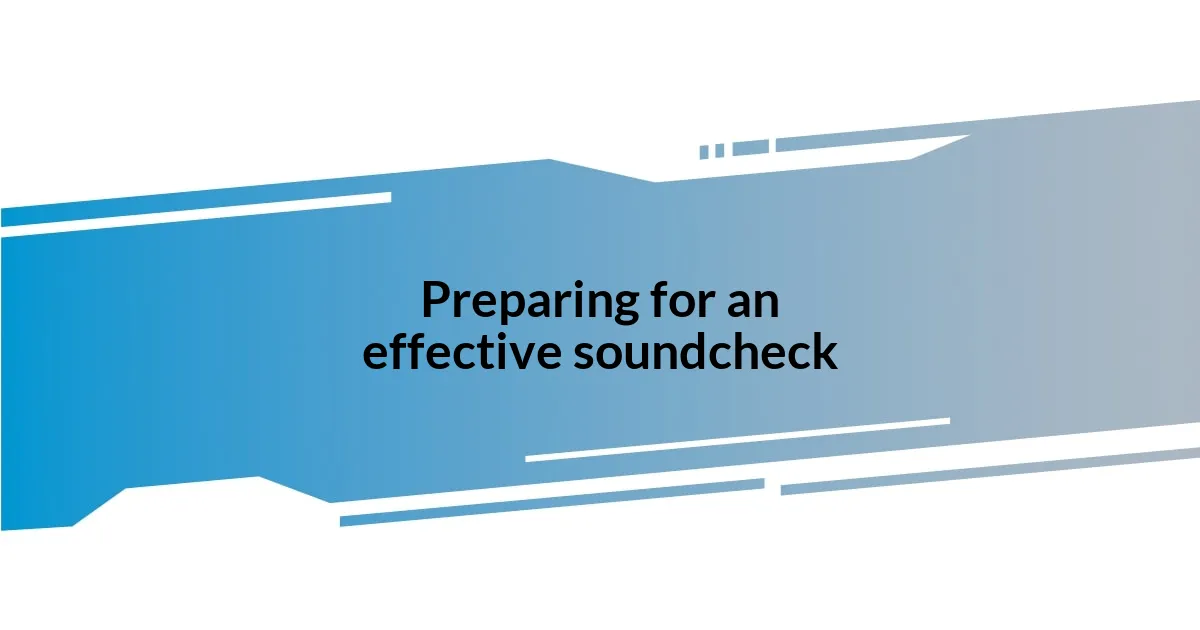
Preparing for an effective soundcheck
Preparing for an effective soundcheck requires careful organization and communication. One thing I’ve learned is that a pre-soundcheck meeting with the band and crew can be immensely helpful. Discussing the setlist, any specific sound preferences, and technical requirements allows everyone to be on the same page. Have you ever been caught off guard during a show because something wasn’t addressed beforehand? I certainly have, and it left me scrambling to catch up.
In my experience, creating a checklist can streamline the soundcheck process. This might include verifying equipment, checking microphone placements, and ensuring every instrument is ready to go. I remember a time when I forgot to check the guitar tuner; that delay cost us precious minutes. It might seem small, but every detail counts in those moments.
Lastly, flexibility is key. Even with the best preparation, unexpected issues can arise. For instance, during one soundcheck, a sudden gust of wind blew through an outdoor venue, affecting the sound. Instead of panicking, we took a moment to adapt our approach, which ultimately led to a stronger performance. Embracing these challenges not only enhances the efficiency of the soundcheck but fosters a collaborative spirit among everyone involved as well.
| Preparation Aspect | Importance |
|---|---|
| Pre-Soundcheck Meeting | Aligns the team and clarifies needs |
| Checklist | Ensures no important detail is missed |
| Flexibility | Allows for adaptation in unexpected situations |
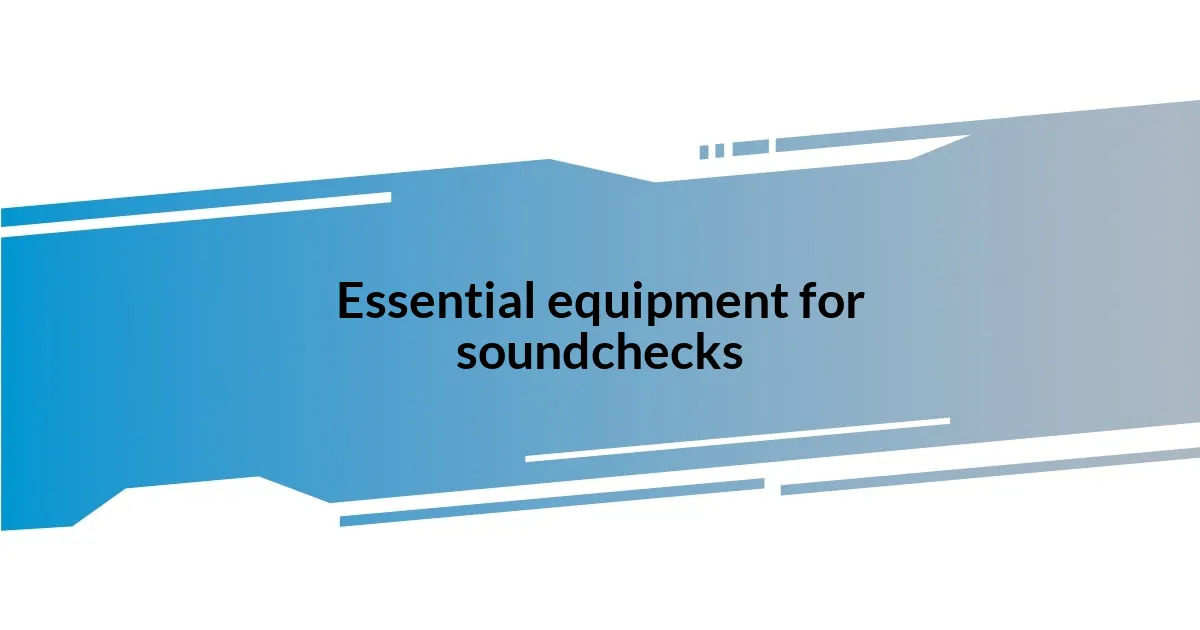
Essential equipment for soundchecks
When it comes to soundchecks, the right equipment can make all the difference. From my many experiences in the field, I’ve found that having a reliable setup not only ensures clarity in sound but also boosts the performers’ confidence. It’s amazing how the right tools can change the vibe. Picture this: I once witnessed a band shift from tentative to electrifying simply because we had the right microphones and monitors in place.
Here’s a quick list of essential equipment I always make sure to have on hand for soundchecks:
- Microphones: Essential for capturing vocals and instruments. Dynamic and condenser mics serve different purposes.
- In-Ear Monitors (IEMs): Crucial for performers to hear themselves and the mix without feedback.
- Mixing Console: The heart of sound management, allowing for control over levels and EQ settings.
- Cables and Connectors: Often overlooked but essential for maintaining a clear signal path.
- Speakers/Monitors: Allow the band to hear themselves accurately, creating an intimate and cohesive sound experience.
In my experience, beyond the technical aspects, the integration of this equipment set fosters an environment of trust between the sound crew and the artists. One time, an artist was struggling to hear their backing vocals during a soundcheck, which can be quite nerve-wracking. After I adjusted the levels and swapped out a monitor for a better one, the change was instantaneous. The relieved smile on their face said it all—good equipment doesn’t just improve sound quality; it creates a space where creativity can flourish.
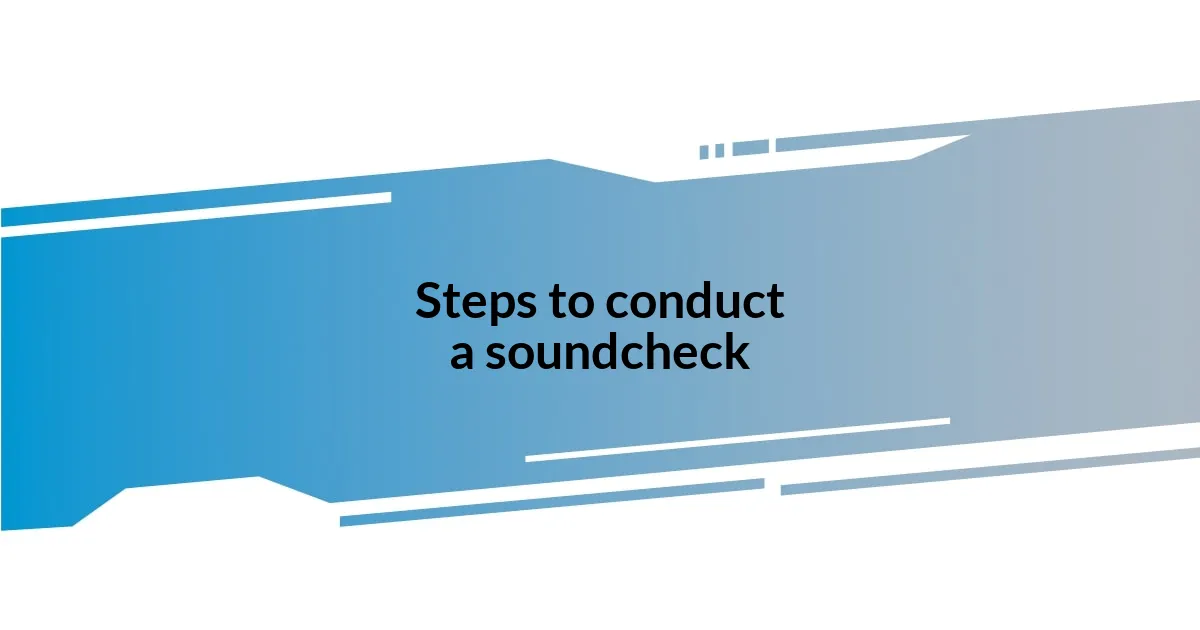
Steps to conduct a soundcheck
Conducting a soundcheck involves several key steps that can significantly enhance the overall experience for both performers and the audience. First, I typically start with a systematic approach, testing each instrument and vocal individually. I remember one particularly hectic soundcheck where we jumped straight to the full band without assessing each element first. The result? A muddled sound that left us scrambling to fix things mid-performance. Establishing a clear order can eliminate that kind of chaos, ensuring everything blends seamlessly.
Next, I always advocate for the use of a reference track during the soundcheck. This trick has served me well! During a gig at an outdoor festival, we played a specific song as a reference after setting everything up. Hearing the familiar sounds helped the band articulate what they needed in terms of levels and effects. It’s like riding a bike—you need that familiar feeling to understand how everything fits together. Why take a guess when you can use something already defined?
Finally, engaging with the performers is crucial. After all, they are the ones translating sound into emotion. I’ve learned to ask for feedback continuously during the process. There’s something rewarding about witnessing a performer light up when the sound is just right. A singer once hesitated to share her preferences out of fear, but once I encouraged her, we tweaked the mix, and her confidence soared. It’s moments like these that highlight the spirit of collaboration during a soundcheck, transforming it from a mundane task into an essential part of the show’s energy.
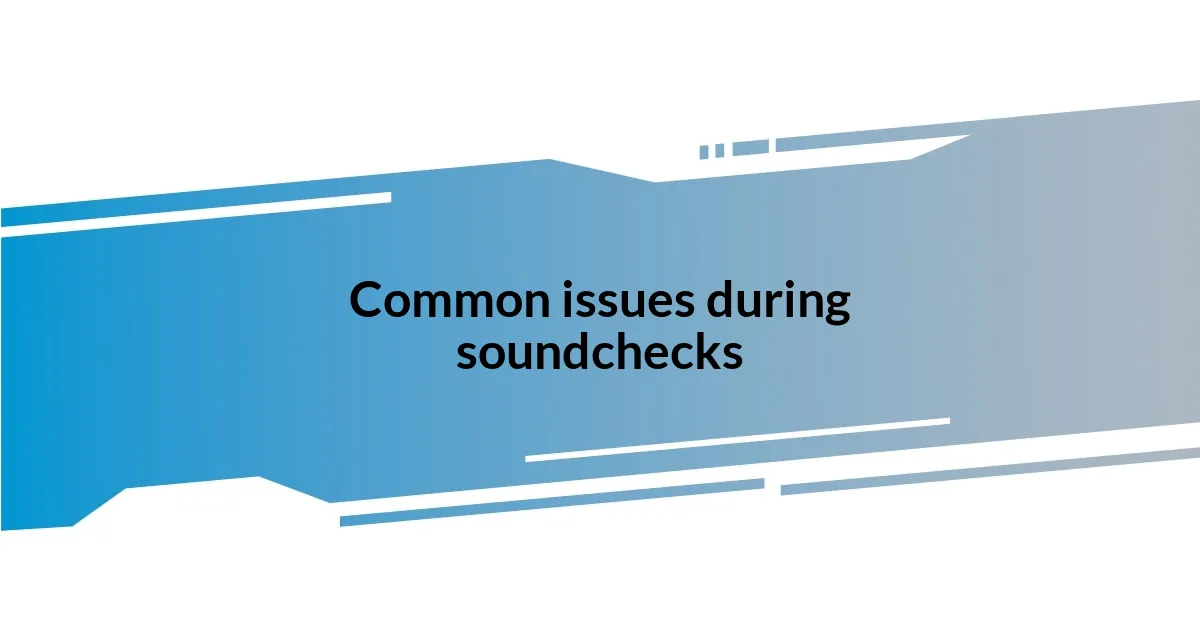
Common issues during soundchecks
During soundchecks, one of the most common issues I encounter is microphone placement. I recall a moment when I was working with a talented vocalist who was adamant about moving the mic closer to her lips for a powerful boost. While I understood her desire for volume, placing it too close caused muddiness in the sound. Finding the sweet spot is crucial—too far, and you lose clarity; too close, and you risk distorting the tone. It’s a delicate balancing act that often takes some trial and error, but it’s essential for capturing that perfect sound.
Another frequent challenge is adjusting monitors to avoid feedback. I’ll never forget a soundcheck where we had an unexpected feedback loop during a delicate guitar solo. The panic in the band’s eyes was palpable, and my heart raced alongside theirs. Feedback issues can stem from positioning or levels, but with a little patience and fine-tuning, we overcame that hurdle. Establishing the right monitor levels upfront can save so much stress down the line—trust me, it’s worth taking the time to get it right.
Lastly, time management often becomes a critical issue, especially in larger venues with multiple acts. I once had to rush through a soundcheck because we ran over time, which left little room for adjustments. The end result was a performance that didn’t quite resonate with the audience as we had hoped. It’s a lesson that often haunts me: always allocate enough time for tweaks, because even small corrections can lead to a significant improvement in the overall experience. Soundchecks should feel thorough, satisfying, and collaborative, not hurried and chaotic. Don’t you agree?
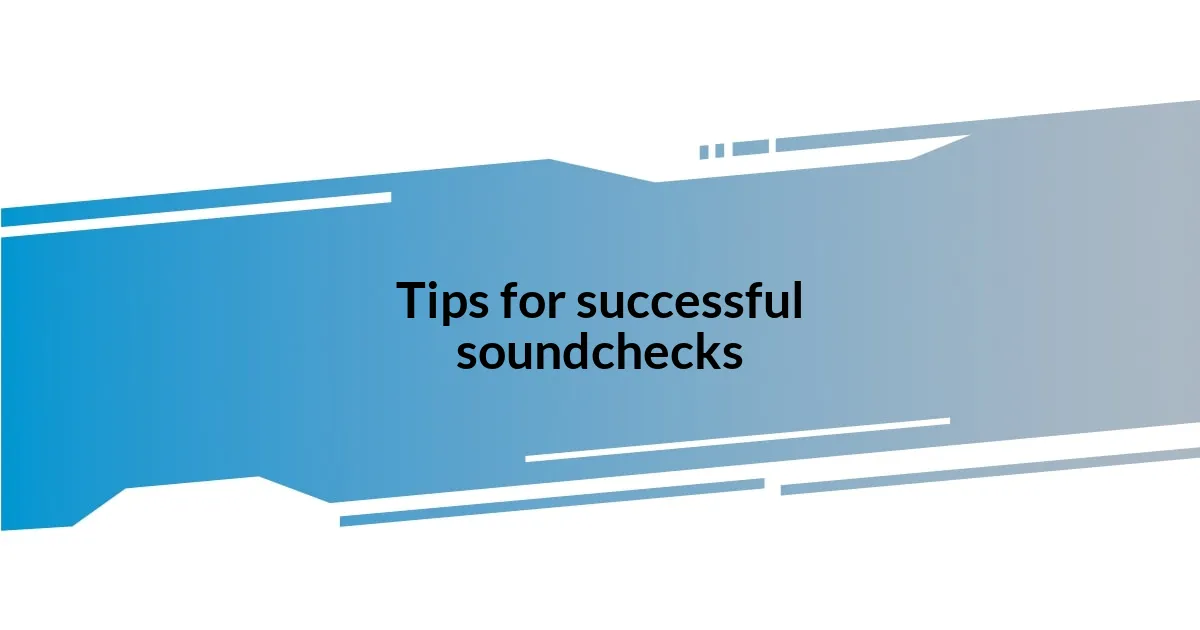
Tips for successful soundchecks
When it comes to successful soundchecks, my first tip centers around communication. I remember a soundcheck where a guitarist and I didn’t have a clear dialogue about his tone preferences. I thought I had dialed in a perfect setting, only to realize midway through that it wasn’t what he envisioned. It was a learning experience for both of us that reinforced the importance of checking in with each performer. How can you set the right mood if you’re not on the same wavelength?
Another crucial aspect is staying organized. I often create a checklist of every sound element, from vocals to instruments, that we need to address. During one particularly chaotic session, we lost track of some settings and ended up with an unbalanced mix that affected the entire performance. I like to insist on ticking off each item as we go; it keeps both my nerves and the overall sound in check. What do I gain from this? Peace of mind, knowing everything is accounted for before the audience arrives.
Lastly, I can’t stress enough the importance of flexibly adapting to the venue. Every location has its quirks—like the time we performed in a spot with unpredictable acoustics. I had to adjust our setup on the fly, experimenting with positions until we found a sweet spot. It reminded me how vital it is to be aware of your surroundings and ready to make decisions on the go. To me, soundchecks are not just about setups; they are also about trust in your instincts and the ever-changing environment around you. Isn’t it exhilarating when that instinctual knowledge pays off?
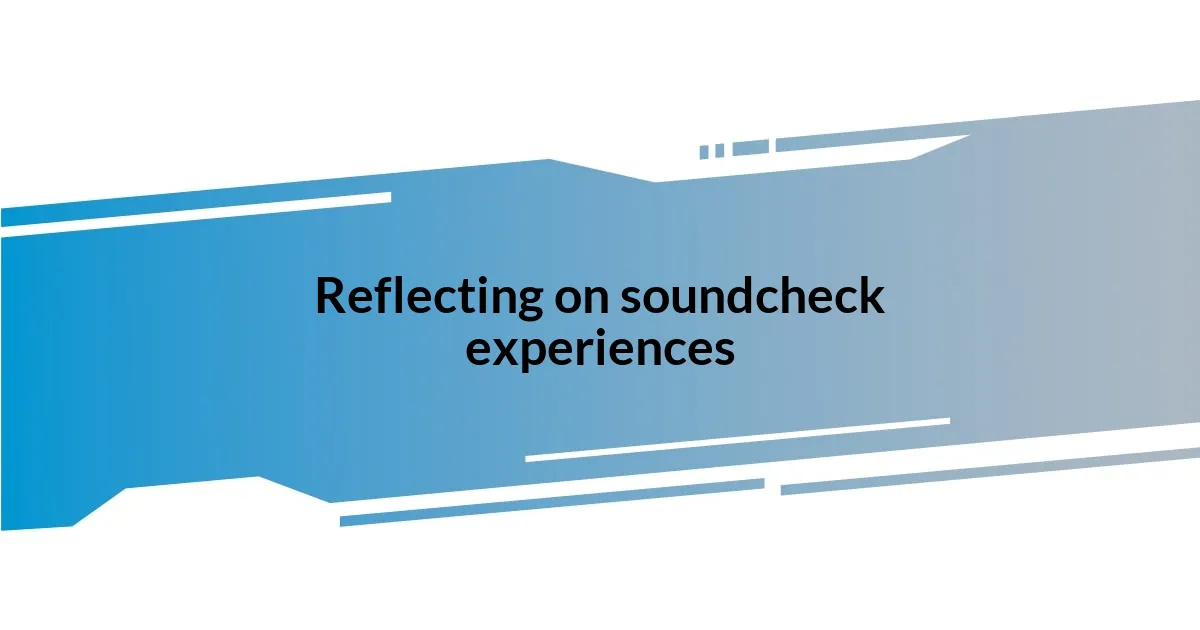
Reflecting on soundcheck experiences
Reflecting on soundcheck experiences brings back a mix of emotions. I remember a night when everything seemed to go right during a soundcheck. The band gelled, the sound was crystal clear, and there was an electricity in the air. It felt like all the hard work and late nights had culminated into something beautiful. Moments like these remind me how rewarding and exhilarating soundchecks can be, setting the tone for a successful performance.
However, not every soundcheck has been smooth sailing. There’s this one instance when an unexpected thunderstorm knocked out power to the venue just as we started. We scrambled to grab our gear and set up under dim emergency lights. It was chaos, but in that whirlwind, I found an unexpected sense of camaraderie with the band. Those shared challenges can create bonds that last well beyond the stage. Have you ever experienced a situation where adversity brought a team closer together?
Then there are the quiet moments of reflection during soundchecks. Sometimes, I take a step back and just listen. I’ll close my eyes and let the music wash over me, tuning into the nuances that can often get lost in the hustle. One time, I realized a small tweak in the bass frequencies made a world of difference in how everything blended together. It’s these subtle discoveries that keep me passionate about sound. How often do we take a moment to appreciate the art behind the science? It’s these reflections that shape my approach and remind me of the artistry in our craft.